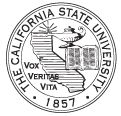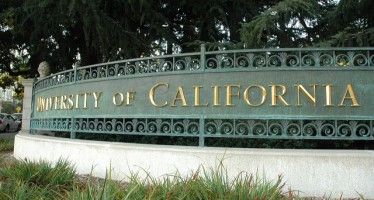Loophole Allows New Cal State Prez to Receive 20% Raise
By JOHN HRABE
A loophole in the California State University’s new executive compensation policy will allow new Cal State Northridge President Dianne Harrison to earn a 20 percent raise over her current salary as president of Cal State Monterey Bay. Harrison, who annually earns $270,315 in base pay as Monterey Bay’s chief, will be eligible to earn $54,185 more per year by switching institutions. The potential pay raise is double the 10 percent limit claimed by the Cal State Chancellor’s office.
In January, the Cal State Board of Trustees responded to public outcry over the $400,000 base salary of San Diego State University President Elliott Hirschman and approved a new 10 percent limit on future presidential pay raises. The text of the policy reads: “When a presidential vacancy occurs, the initial base salary, paid with public funds, to the successor president, shall not exceed ten percent of the previous incumbent’s pay.”
The carefully-worded language means that Harrison’s pay raise won’t be based on her current salary but that of former CSUN president Jolene Koester, who retired in December. Kester’s base salary was $295,000 per year. A 10 percent increase would bring the new CSUN presidential salary to $324,500.
If the 10 percent cap were applied to Harrison’s current pay, she’d only be eligible to receive $297,346.50 per year, or a $27,000 boost.
Loophole
The Cal State Board of Trustees has yet to determine Harrison’s salary. The Monterey County Herald reported, “Her new salary at CSU Northridge will be determined at a future board of trustees meeting.” However, recent board actions and trustee statements give some indication that the board is likely to exploit the loophole. This week, Cal State Trustees handed out 10 percent pay raises to the two new college presidents at Fullerton and East Bay, while simultaneously threatening enrollment cuts.
“I’m just sorry we can’t pay them more because of the policy we adopted,” CSU Trustee Roberta Achtenberg said at this week’s board meeting, the Los Angeles Times reported.
Base pay is only one component of the total compensation provided to college presidents, who also receive $72,000 per year in car and housing allowances, more than the annual salaries of 3,888 Cal State professors. The board has a history of providing top administrators with other perks and benefits that have not been widely reported by the media.
In 2008, Cal State Trustees approved a compensation package for then-San Jose State University President Jon Whitmore that included an annual $25,000 bonus from foundation sources, $18,775 for moving costs, $66,577 in escrow fees for the sale of his Texas residence, CalPERS retirement benefits an annual medical physical examination, top-of-the-line health plan, insurance programs, vacation days, sick leave accruals and eligibility for the system’s transitional program for university presidents. These perks were in addition to a $328,209 base salary and the housing and car benefits.
The presidential transfer loophole also exposes the hollow and ineffectual nature of a pay cap recently approved by a California Senate committee. On March 21, the Senate Education Committee passed SB 952 by Sen. Elaine Alquist, D-Santa Clara, instead of a tougher option proposed by Senator Leland Yee, D-San Francisco.
According to the text of SB 952, “This bill would prohibit, on or after July 1, 2012, and until July 1, 2018, the Trustees of the California State University from entering into, or renewing, a contract that provides for a compensation increase for any administrator, as defined, of more than 10 percent using General Fund moneys in the fiscal year during which the contract is executed, relative to the immediately past contract for that same position.” Yee’s SB 967 would prohibit raises for Cal State University’s top administrators during bad budget years or within two years of a student fee hike.
Tougher Bill
Senate President Pro Tem Darrell Steinberg, D- Sacramento, said Thursday that he was unsatisfied with the Alquist measure and may support Yee’s more stringent cap. The Los Angeles Times reported that Steinberg “suggested that the bill, sponsored by Sen. Elaine Alquist (D-Santa Clara), should be tougher and apply to other top executives besides presidents.”
CalWatchDog.com has previously reported on the numerous loopholes in Cal State’s new executive compensation policy, including the option of supplementing presidential salaries through university foundations. A CalWatchDog.com investigation has also revealed numerous financial irregularities in the tax returns of these Cal State foundations. The Tower Foundation of San Jose State University on federal tax returns for 2007, 2008 and 2009 reported zero compensation paid by the organization or any related organizations to more than a half dozen high-ranking university personnel, including the college’s president, provost, athletic director and several vice-presidents.
This week, CalWatchDog.com first reported that the California State University Office of the Chancellor understated the annual compensation of San Francisco State University President Robert Corrigan by as much as $52,787.
Earlier this month, CalWatchDog.com revealed that Cal State Los Angeles President James Rosser reported $515,612 in annual compensation to the IRS for the 2009-10 tax year. In at least five instances, Cal State officials have falsely claimed or implied Rosser’s compensation was nearly $200,000 less. On March 12, the California State University system falsely claimed to have received a 2012 Sunshine Award, which recognizes “the most transparent government websites in the nation.”
The California State University Chancellor’s Office has not responded to repeated requests for comment and clarification about its executive compensation.
Related Articles
Teachers union dues rise along with pay
The Los Angeles Unified School District this month agreed to a 10 percent raise for teachers, creating a deficit for the
In CA, Smarter Balanced testing shapes fate of Common Core
It’s crunch time for California supporters of the new Common Core educational standards. On several fronts, key business, education and political interests have
Lawsuit over Harvard admissions has CA overtones
Harvard University is facing a well-financed lawsuit over its admissions practices, with plaintiffs arguing that the nation’s oldest, richest and





